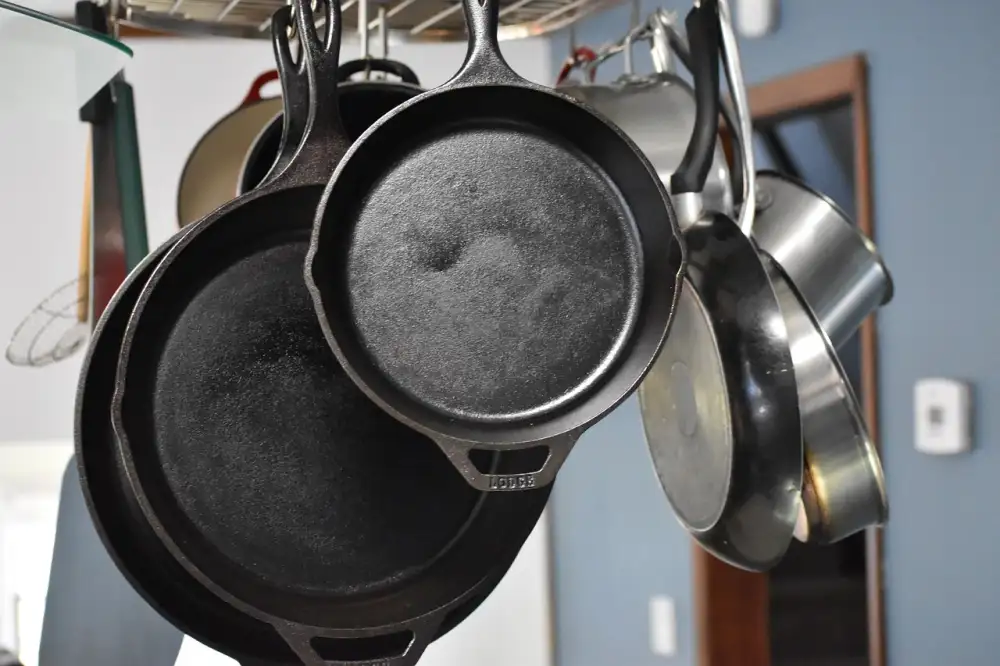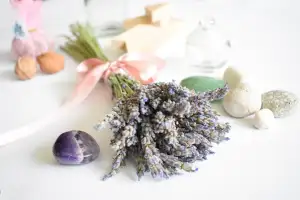Ultimate Guide: How to Clean a Cast Iron Skillet Like a Pro

- Gather necessary materials: kosher salt, a soft sponge or brush, dish soap, a clean towel, and vegetable oil.
- Allow the skillet to cool down slightly after use but not completely cold.
- Sprinkle kosher salt on the skillet's surface to act as a gentle abrasive.
- Use a soft sponge or brush to scrub the salt in circular motions, removing any food residue.
- Rinse the skillet under warm water, avoiding the use of soap at this stage.
- Dry the skillet thoroughly with a clean towel to prevent rusting.
- Apply a thin layer of vegetable oil to the skillet's surface to season and protect it.
- Store the skillet in a dry place to prevent moisture buildup and maintain its seasoning.
Introduction: Proper cleaning of a cast iron skillet is essential for maintaining its longevity and non-stick properties. Cast iron cookware, when properly cared for, can last for generations due to its durability and versatility. Failure to clean a cast iron skillet correctly can lead to rusting, loss of seasoning, and diminished non-stick capabilities. By following the right cleaning techniques, you can ensure that your cast iron skillet remains in top condition, ready to deliver exceptional cooking results every time.
Gather necessary materials: kosher salt, a soft sponge or brush, dish soap, a clean towel, and vegetable oil.
To properly clean a cast iron skillet, it is essential to gather the necessary materials beforehand. You will need kosher salt, which acts as a gentle abrasive, a soft sponge or brush for scrubbing, dish soap for tougher stains (optional), a clean towel for drying, and vegetable oil for seasoning and protection. Having these items ready will ensure an effective cleaning process and help maintain the skillet's longevity and non-stick properties.
Allow the skillet to cool down slightly after use but not completely cold.
After using your cast iron skillet, it's crucial to allow it to cool down slightly before cleaning. This step is essential to prevent warping or cracking that can occur when exposing a hot skillet to cold water. While it's important not to let the skillet get completely cold as this can lead to food residue sticking firmly to the surface, allowing it to cool just enough will make the cleaning process more effective and help maintain the skillet's longevity and non-stick properties.
Sprinkle kosher salt on the skillet's surface to act as a gentle abrasive.
Sprinkling kosher salt on the surface of your cast iron skillet after use can work wonders in removing stubborn food residues without damaging the seasoning. The coarse texture of kosher salt acts as a gentle abrasive, helping to lift off any stuck-on bits while being gentle enough not to scratch the skillet's surface. This method is effective in maintaining the skillet's non-stick properties and preventing the buildup of grime over time.
Use a soft sponge or brush to scrub the salt in circular motions, removing any food residue.
Using a soft sponge or brush is crucial when cleaning a cast iron skillet to prevent scratching its seasoned surface. Gently scrubbing the kosher salt in circular motions helps to lift off any stuck-on food residue without damaging the skillet's non-stick properties. This method effectively removes debris while preserving the skillet's seasoning, ensuring it remains in top condition for cooking delicious meals.
Rinse the skillet under warm water, avoiding the use of soap at this stage.
Rinsing the cast iron skillet under warm water is a crucial step in the cleaning process. Avoid using soap at this stage as it can strip away the skillet's seasoning, which is essential for its non-stick properties. The warm water helps to loosen any remaining food particles without compromising the skillet's natural oils. Be sure to thoroughly rinse off all the salt and food residue to prevent any buildup that could affect the skillet's performance.
Dry the skillet thoroughly with a clean towel to prevent rusting.
After rinsing the skillet under warm water, it is crucial to dry it thoroughly with a clean towel to prevent rusting. Any leftover moisture on the surface can lead to rust formation, which can damage the skillet over time. Ensure that all water droplets are removed from both the interior and exterior of the skillet before proceeding to the next step in the cleaning process. This simple yet essential step will help maintain your cast iron skillet in optimal condition for years to come.
Apply a thin layer of vegetable oil to the skillet's surface to season and protect it.
To maintain the seasoning and prevent rusting, it's crucial to apply a thin layer of vegetable oil to the skillet's surface after cleaning. This process, known as seasoning, creates a protective layer that helps keep the skillet non-stick and prevents it from deteriorating over time. The oil also adds flavor to your dishes and enhances the skillet's natural non-stick properties. Be sure to use a paper towel to spread the oil evenly across the entire surface, including the handle and exterior. This simple step will help prolong the life of your cast iron skillet and ensure its excellent cooking performance for years to come.
Store the skillet in a dry place to prevent moisture buildup and maintain its seasoning.
Proper storage is crucial for maintaining the seasoning of your cast iron skillet. Store it in a dry place to prevent moisture buildup, which can lead to rusting. Avoid storing it with the lid on or in a humid environment. If stacking with other cookware, place a paper towel between each piece to prevent scratches and allow air circulation. By storing your skillet correctly, you can ensure its longevity and non-stick properties for years to come.
Published: 23. 04. 2024
Category: Home



